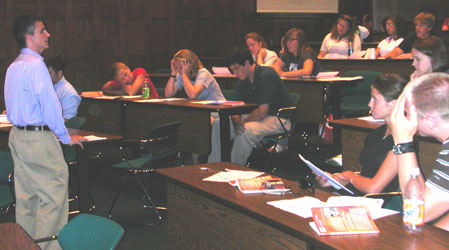|
|

| June 2006 Thomas Shields, Director of the Center for Leadership in Education, Targets K-12 Community Every year Jepson receives numerous inquiries about its leadership studies program from a wide range of organizations, including institutions of higher learning, corporations, nonprofits, government institutions and primary and secondary schools. As the first school to offer an undergraduate degree in leadership studies, Jepson has played a pivotal role in developing and shaping the field of leadership studies in a way replicated by many other organizations. Shortly after Thomas Shields came to the Jepson School as an adjunct professor in fall 2001, he helped James River High School, a public school in nearby Chesterfield County, develop a leadership curriculum that resembled the Jepson model. With his assistance, the high school’s Center for Leadership and International Relations, began incorporating classes such as “Foundations,” “Ethics” and “Critical Thinking” into its curriculum. Shields and Douglas Hicks led the weeklong orientation program for the inaugural class of freshmen in the James River leadership program in fall 2002. Shields didn’t give up on the idea of introducing leadership studies to other primary and secondary schools. In fall 2004, he met several times with Dean Kenneth Ruscio of the Jepson School and Dean James Narduzzi of the School of Continuing Studies. The three discussed the possibility of creating a center focused on leadership education in primary and secondary schools. After several conversations, they decided that a University center could successfully apply the leadership studies curriculum of the Jepson School and the community orientation of the School of Continuing Studies to K-12 students, teachers and administrators. Shields oversaw a trial K-12 outreach initiative dubbed the Next Generation Leadership Academy (NGLA) during spring 2005. The academy offered leadership education for individuals aspiring to the principalship of primary and secondary schools, including a mentoring component based on a medical-residency model in which current principals served as mentors to aspiring principals. Following the success of this pilot program, the State Council of Higher Education for Virginia (SCHEV) awarded Shields a grant in the amount of $102,653 to support the NGLA’s first full-length program during the 2005-06 academic year, involving 40 participants and 30 mentors. The Center for Leadership in Education (CLE) officially launched in summer 2005 with Shields as its director to coordinate the NGLA and other K-12 leadership initiatives in the surrounding counties of Chesterfield, Hanover and Henrico. For example, Shields continues to work closely with Chesterfield County’s James River High School on its Center for Leadership and International Relations. On May 31 he led a half-day seminar hosted at Jepson as part of the exit program for the 34 seniors in the high school’s inaugural leadership class. Shields and a number of Jepson students also conduct leadership studies classes and seminars at Henrico County’s Freeman High School. Almost 50 high-school seniors from the Emerging Leaders program, a collaborative effort between Hanover County Public Schools and the CLE, participated in the weeklong Summer Leadership Institute held on the University campus during summer 2005, and a similar number are expected to participate this summer. In addition to these programs for high-school students, this past year the CLE also offered the six-session Issues in Leadership, a breakfast series for Chesterfield County Public School administrators that featured presentations by Jepson faculty members and high-profile educators. On August 1-3, the CLE, in collaboration with the Virginia Association of Independent Schools, will host the Emerging Leaders Institute (ELI) at Jepson. Jepson faculty members will discuss leadership theory on topics such as ethics and group dynamics and education practitioners will teach applied methodology to a targeted audience of private-school employees aspiring to principalships and high-level administrative roles. Shields estimated that some 400 individuals participated in the various programs offered by the CLE during its first year of operation. Eventually Shields hopes to broaden the scope of the CLE’s offerings from a local audience to a regional audience to a national audience, he said. “Teachers and administrators in the K-12 setting are struggling with the same ideas about leadership we struggle with at Jepson,” Shields said. “The center is trying to introduce them to Jepson’s reflective way of looking at leadership and analyzing it. We are not in the business of leadership-skills training.” “In the future I would like to see the center offer a program for teachers to analyze the Jepson curriculum so that they can then make use of it in their classrooms,” Shields said. “I also hope the center can offer a national residential program for school superintendents to get them to start thinking about their own leadership and what it means for their organizations.” In addition to serving as the director of the CLE, Shields carries a full teaching load at Jepson, usually teaching two or three classes a semester, such as “Foundations of Leadership,” “Analyzing and Making Policy” and “Leadership in Political Contexts.” Shields, who holds a PhD in public policy, spends his summers teaching at the University of Virginia’s Sorenson Institute for Political Leadership, a program designed to foster young people’s civic engagement on the local and state levels. And like most professors, he works constantly on publications. All these commitments add up to a heavy, some would say, onerous, workload. But Shields’ obvious enthusiasm for leadership studies and his desire to disseminate knowledge of this emerging field to an ever-broader audience keep him focused and motivated. |
